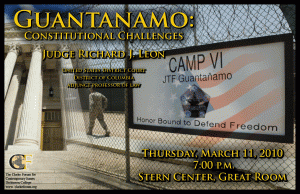U.S. District Court Judge, Washington, D.C.
Guantanamo: Constitutional Challenges
Thursday, March 11, 2010
Stern Center, Great Room, 7:00 p.m.
* This event is part of the Clarke Forum’s series on Leadership in an Age of Uncertainty.
As the first federal judge to conduct habeas corpus proceedings to determine the lawfulness of the detention of the Guantanamo detainees, Judge Leon had to confront many practical and legal challenges as he tried to strike the proper balance between liberty and national security.
Topical Background
September 2001: Following the September 11 terrorist attacks, Congress passes The Authorization for Use of Military Force (AUMF)
This resolution grants the executive branch power to use all “necessary and appropriate force” against those associated with terrorism, particularly those related to the September 11 attacks.
January 2002: United States opens detainment facility at Guantanamo Bay
The Bush administration argues the camp falls outside of U.S. legal jurisdiction, and the detainees, known as “enemy combatants,” are not protected by the Geneva Convention.
June 2004: Supreme Court decides Rasul v. Bush
Supreme Court declares that habeas corpus rights (the right to claim wrongful imprisonment) apply to Guantanamo detainees because the United States has “complete jurisdiction” of Guantanamo Bay.
June 2004: Supreme Court decides Hamdi v. Rumsfeld
On the same day as the decision in Rasul, the Supreme Court recognizes that the government is allowed to detain “enemy combatants,” but declares that U.S. citizens captured and detained in the War on Terror must be allowed to challenge their status and detention.
December 2005: Congress passes Detainee Treatment Act (DTA)This legislation, while prohibiting inhumane treatment of the detainees, strips federal courts of jurisdiction over habeas petitions. Instead, habeas petitions shall be decided upon by Combatant Status Review Tribunals (CRST’s), which are military tribunals that determine whether a detainee is truly an “enemy combatant.”
June 2006: Supreme Court decides Hamdan v. Rumsfeld
Court rules that the DTA does not strip federal courts of jurisdiction over pending habeas cases.
October 2006: Congress passes Military Commissions Act of 2006
This legislation grants executive branch full power to determine who is an “unlawful enemy combatant” through a CRST. According to the legislation, no matter when a detainee submitted their habeas petition, their case will be heard before a CRST.
June 2008: Supreme Court decides Boumediene v. Bush
Court declares the Guantanamo Bay detainees have a constitutional right to challenge their detention in U.S. courts. DTA hearings and CRST’s are not an adequate substitute because they allow coerced testimony and hearsay as evidence.
Recent Developments
As of January 22, 2010, 41 detainees have challenged their status as “enemy combatant” before the U.S. District Court for the District of Columbia. However, 17 of these cases involved detainees whom the U.S. government does not consider “enemy combatants,” but has not found a location to release them.
About the Speaker
Judge Leon was appointed to the United States District Court in February 2002. He received his B.A. from Holy Cross College in 1971, his J.D. cum laude from Suffolk Law School in 1974, and his LL.M. from Harvard Law School in 1981. Immediately prior to his appointment to the bench, Judge Leon was engaged in private practice in Washington, D.C., as a partner in the Washington office of Baker & Hostetler (1989-1999), and Vorys, Sater, Seymour and Pease (1999-2002). Prior to and while in private practice, Judge Leon served as counsel to Congress in the investigations of three sitting Presidents. In 1987, he was the Deputy Chief Minority Counsel for the U.S. House Select “Iran-Contra” Committee. From 1992-1993, he was the Chief Minority Counsel to the U.S. House Foreign Affairs Committee’s “October Surprise” Task Force. In 1994, Judge Leon was Special Counsel to the U.S. House Banking Committee for its “Whitewater” investigation. He also served in 1997 as Special Counsel to the bipartisan U.S. House Ethics Reform Task Force. Earlier in his career, Judge Leon served at the U.S. Department of Justice in a number of positions including Deputy Assistant Attorney General in the Environment Division, Senior Trial Attorney in the Criminal Section of the Tax Division, and as a Special Assistant United States Attorney in the Southern District of New York. He also served as a Commissioner on the White House Fellows Commission and the Judicial Review Commission on Foreign Asset Control. A former full-time law professor at St. John’s Law School (1979-1983), Judge Leon is currently an adjunct law professor at the Georgetown University Law Center and the George Washington University Law School.

